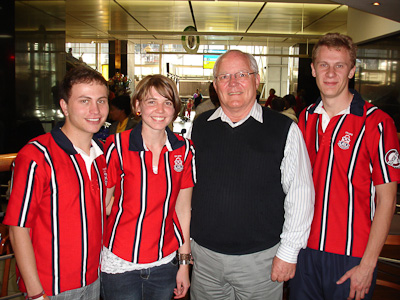Latest News Archive
Please select Category, Year, and then Month to display items
02 January 2025
|
Story Gerda-Marie van Rooyen
|
Photo Supplied
 Leading the research in South Africa is Prof Linus Franke from the Department of Soil, Crop and Climate Sciences.
Leading the research in South Africa is Prof Linus Franke from the Department of Soil, Crop and Climate Sciences.
Scientists are actively pursuing the successful breeding of diploid hybrid potatoes from inbred lines. This is expected to revolutionise potato breeding as it holds the key to rapid genetic progress. It will introduce new varieties for commercialisation through seed. Currently, existing potato variants have a gene that renders self-pollinated seeds infertile.
Prof Linus Franke, an academic in the Department of Soil, Crop and Climate Sciences at the UFS, is leading the research in South Africa. “This technology allows the production of genetically uniform potato seed that is easy to transport and largely disease-free.” He says this differs from conventional breeding whereby only vegetative propagation is possible due to tetraploid varieties in potatoes. It also risks carrying pests and diseases from one generation to the next – leading to the accumulation of pests and diseases with each round of multiplication.
Seed innovation
Prof Franke explains that Solynta BV, a seed company based in the Netherlands that produces potato varieties that can be grown from seed, has included South Africa in their research efforts because it is one of Africa’s largest producers and exporters. Through his academic relationship with Wageningen University and Research, a Dutch institution renowned for its agricultural endeavours and food production, the UFS became involved in researching hybrid potatoes grown from seed.
Diploid seeds containing two sets of chromosomes allow easier gene manipulation to increase predictability and speedier genetic progress. The breeding approach enables the incorporation of tolerance to pests, diseases, abiotic stresses (cold, heat, drought) and other desired genetic traits.
Although Prof Franke is optimistic about this research, he is not blind to disadvantages. “Potato seeds are tiny and have little energy reserves, making it harder to grow potatoes from seed than from tubers.” He says potatoes from seed will take longer to cultivate than tubers, as farmers need to grow plantlets from seeds first, adding six weeks to the growing period. “It is possible that commercial farmers can grow potatoes directly from seed. Alternatively, perhaps more likely, specialised growers will produce tubers of potatoes from seed; these tubers are then sold as seed tubers to other potato farmers, who then continue their normal practices of producing potatoes for the market from tubers.”
Financial benefits
Prof Franke says farmers have reason to get excited. “Seed potatoes will reduce input costs, as varieties with enhanced tolerance to pests and diseases require less pesticides. Planting one hectare of potatoes requires three to four tonnes of potato tubers, but only one 25 g packet of potato seeds.” Since potatoes are a more valuable commodity than maize, this technology might also increase farmers’ income potential.
Kovsies still enjoy successful exchange opportunity
2010-08-25
 |
| Students Ian Botha, Lize Swart and SW Meintjies with Prof. Izak Groenewald (second from right) at the O.R. Tambo International Airport in Johannesburg upon the student’s recent departure to Virginia Tech. Photo: Supplied |
More than a decade ago, the then Chairperson of Free State Agriculture, Piet Gous, in collaboration with the then Dean of the Faculty of Natural and Agricultural Sciences at the University of the Free State (UFS), Prof. Piet Wilke, started an exchange initiative which still makes a difference to students’ lives today.
Students at the university get the opportunity to go and study at the Virginia Polytechnic Institute and State University (Virginia Tech) in Blacksburg in the United States of America (USA) during the second semester. During the first semester the UFS then receive American students. Since its inception in 1998, 142 students have already participated in the exchange programme.
“It is not only about six months’ studies at an American university. It is about the expansion of horizons, the creation of new frames of reference and exposure to other cultures and customs in order to attain and experience more life capacity,” says Prof. Izak Groenewald, Director of the Centre for Sustainable Agriculture and Rural Development at the UFS. Prof. Groenewald has acted as coordinator of this student exchange programme since 1997.
According to Prof. Groenewald, the secret of the successful programme rests with the fact that Kovsies pay their tuition and accommodation fees at the UFS as if they were studying here. However, they enjoy the privileges at Virginia Tech. Similarly, the American students pay their corresponding fees at Virginia Tech and then enjoy the privileges offered by the UFS.